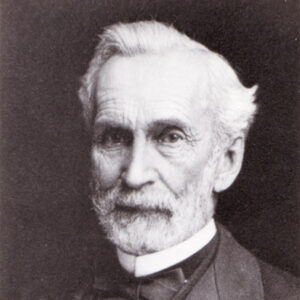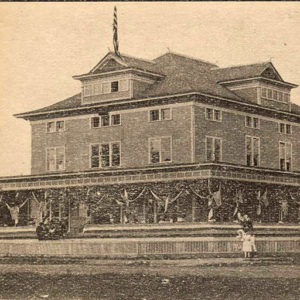calsfoundation@cals.org
Edward Savage Crossett (1828–1910)
Edward Savage Crossett was a pioneer Arkansas lumberman during the late nineteenth century. As the great Southern forest was being developed to meet a growing nation’s need for lumber and wood fiber, Crossett and two associates—all from Davenport, Iowa—came to south Arkansas, acquired land, and began a sawmilling operation that was one of the largest of its kind. The city of Crossett (Ashley County) was named for him and came to be known as “The Forestry Capital of the South.”
Edward Crossett was born on February 4, 1828, in West Plattsburgh, New York, one of three children of Mary Gregory and John Savage Crossett, a veteran of the War of 1812. Crossett received his early education in the public schools of the area and in a private academy. His first employment was in a printing office in Troy, New York, which position he soon abandoned due to failing health. His next position, in 1846 as a clerk in a shoe store, paid $2.50 per month and board.
In 1848, Crossett and his brother purchased the store, and they soon began handling small quantities of pine and spruce lumber. It was Crossett’s first exposure to the lumber business. In 1850, he turned the business over to his brother and started west to seek his fortune. By 1853, he had settled in Black River Falls, Wisconsin, where he took charge of a supply store for lumbermen. His experience as a merchant in the Adirondacks served him well, and he eventually ran a larger supply store, the combination of four smaller operations. He served as postmaster of Black River Falls from 1854 to 1856.
During these years, Crossett continued trading in lumber, with mixed results. He managed lumber yards throughout the Mississippi River Valley. At one time, he ran the yards of Isaac Spaulding in East Saint Louis, Illinois. From 1870 to 1875, he was engaged in scaling logs and estimating timber, purchasing parcels of timberland for himself along the way.
On October 1, 1873, Crossett married Harmony Clark of Pittsfield, Massachusetts. They had one son. The couple lived in Nielsville, Wisconsin, until 1875, when they moved to Davenport, Iowa, where Crossett became a member of the trading firm of Renwick, Shaw and Crossett.
In 1882, Crossett made his first investment in yellow pine, which was the predominant softwood species in the Southern forest. In 1886, he sold his interest in the Renwick firm, taking as payment 10,000 acres of Arkansas land covered with yellow pine. His friends were confident that he had made a serious mistake in this exchange. Having personally inspected it, Crossett was convinced of the great possibilities in yellow pine, and his judgment was speedily vindicated. Along the way, he became interested in other lumber companies just setting up operations in the same part of Arkansas.
With fellow Iowans Charles Warner Gates and Dr. John Wenzel Watzek as investors in 1899, the Crossett Lumber Company was organized. Crossett, Watzek, and Gates held three-fourths of the stock of the new enterprise, with certain key employees allotted the remainder. Crossett was elected vice-president of the company in their organizational meeting. Charles Gates’s brother Edgar Woodward “Cap” Gates was dispatched to south Arkansas to supervise the building of the mills and a new community, which his associates named in Crossett’s honor.
Crossett died on December 13, 1910, in Davenport. Obituaries noted him as one of Davenport’s leading citizens. He was a principal donor to St. John’s Methodist Episcopal Church, of which he was a long-time member, and to the Young Men’s Christian Association (YMCA) of Davenport. He is buried in the Oakdale Cemetery in Davenport.
For additional information:
Balogh, George W. Entrepreneurs in the Lumber Industry: Arkansas, 1881–1963. New York: Garland Publishing, Inc., 1995.
Buckner, John W. Wilderness Lady: A History of Crossett, Arkansas. Little Rock: Rose Publishing Company, 1979.
“The Story of a Yellow Pine Sextet.” American Lumberman. March 5, 1904, pp. 43–74.
Bill Norman
Little Rock, Arkansas
Staff of the Encyclopedia of Arkansas History & Culture
 Business, Commerce, and Industry
Business, Commerce, and Industry Post-Reconstruction through the Gilded Age, 1875 through 1900
Post-Reconstruction through the Gilded Age, 1875 through 1900 Edward Crossett
Edward Crossett  E. S. Crossett Club
E. S. Crossett Club 




I am grateful to learn more about my great-great-grandfather, Edward Savage Crossett. His son, my great-grandfather, was Edward Clark Crossett (nicknamed Gumpy), whom I never met. But his wife, Elizabeth Rankin Crossett (nicknamed Ganga), I did have the privilege of knowing. Apparently, according to my father, James Rankin French, when I was a child, I asked Ganga, “How much money do you have?” She replied, “I dont know.” My reply was, “Why dont you count it?!” She said, “I dont have the time.” My father later said when I was older, “I always wanted to ask her that!”